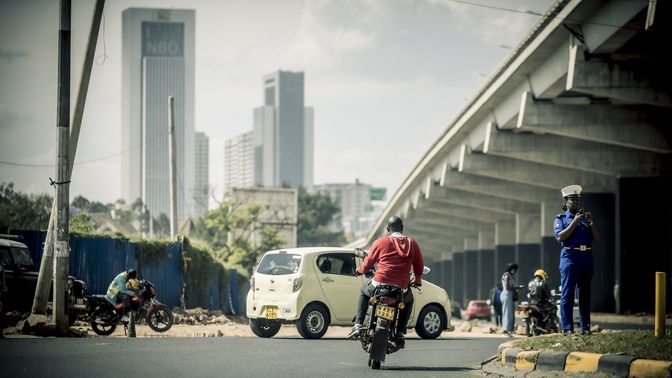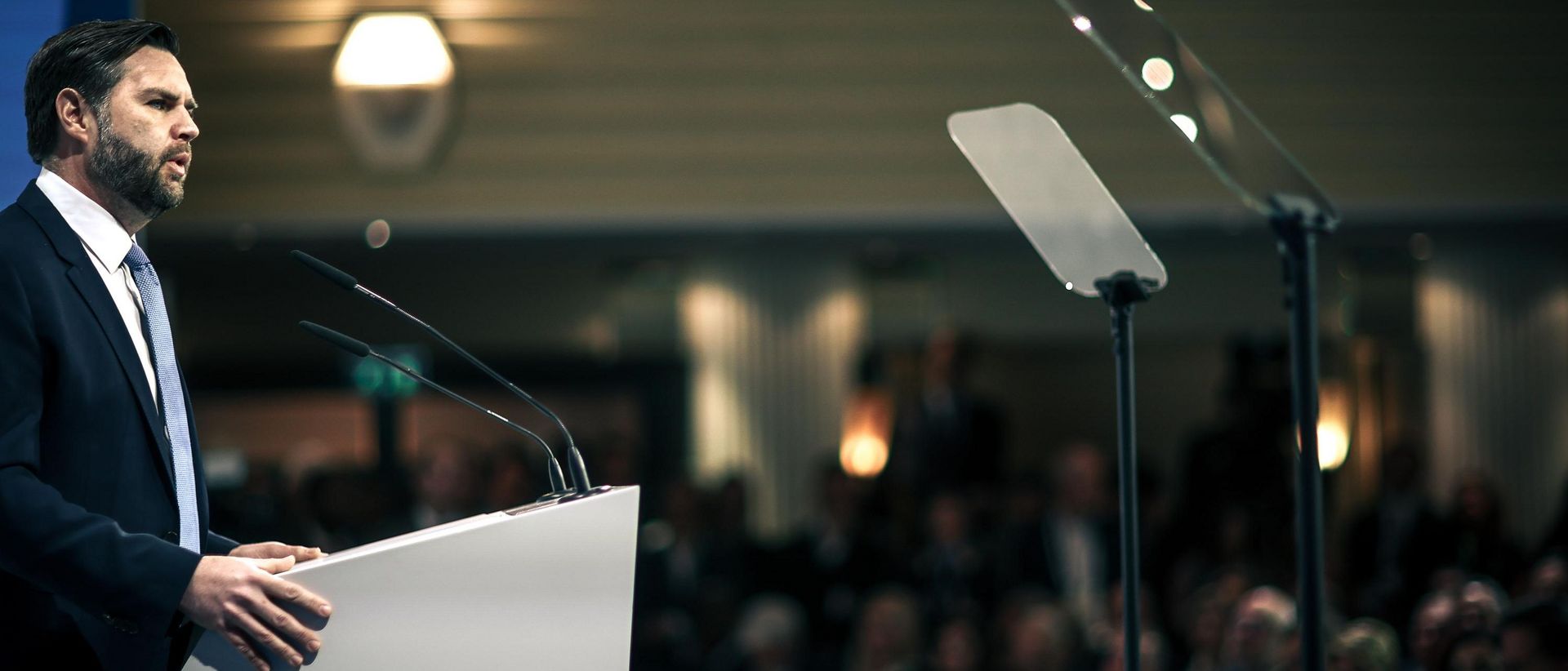

Westlessness Reloaded?
Key Takeaways From the Munich Security Conference 2025
 AuthorTobias Bunde
AuthorTobias Bunde AuthorSophie Eisentraut
AuthorSophie Eisentraut
 AuthorTobias Bunde
AuthorTobias Bunde AuthorSophie Eisentraut
AuthorSophie Eisentraut
Key Points
JD Vance’s first major foreign policy speech as US Vice President shook the transatlantic partnership to its core. To many participants, this year’s transatlantic family reunion felt like a disunion.
The Trump administration’s policies may accelerate the world's “multipolarization.” Europeans are seeing an ever greater need to become an independent pole to secure their own destiny, while many in the Global South seem to be reeling from the end of the US-led order – and some are seeking to fill the void.
The beginning negotiations on a peace deal for Ukraine – and the overall fate of the country – will provide a glimpse into the emerging order, which increasingly appears to be shaped by great-power deals rather than by international law.
The defenders of an international order based on universal rules will have to forge new partnerships and increase their investments. But debates in Munich left unclear whether these actors are willing and able to do so.
The annual Munich Security Conference is often described as the place to take the temperature of world politics and assess the state of the transatlantic partnership. This year, the only question was: How bad is it? After mixed messages from the new US administration had already intensified concerns among US allies, US President Donald Trump’s surprise announcement of a long phone call with Russian President Vladimir Putin, along with US Secretary of Defense Pete Hegseth’s outline of a potential peace deal with Russia on the eve of the conference, put most attendees on high alert. The horrible terrorist attack in Munich, which claimed at least two lives, added further tensions to the situation even before the conference officially began.
Transatlantic Family Disunion?
Enter US Vice President JD Vance. While most participants had anxiously waited for additional details about the Trump administration’s views on the future role of the United States in Europe, demands for increased European defense spending, a partial withdrawal of US troops from the continent, and a preview of US negotiations with Russia, Vance delivered a speech that sent shockwaves through Europe for different reasons. Scolding European democracies for their alleged departure from “shared values,” the Vice President questioned Europe’s interpretation of freedom of speech, criticized its unwillingness to rein in “out-of-control migration,” and lambasted the German liberal-democratic parties’ refusal to cooperate with the far right. As Vance put it, “the threat that I worry the most about vis-à-vis Europe is not Russia, it’s not China, it’s not any other external actor. What I worry about is the threat from within.”
While participants in Munich offered different interpretations of who Vance’s intended audience was, the speech provoked strong responses from German leaders present in Munich. Defense Minister Boris Pistorius on Friday as well as Chancellor Olaf Scholz, CDU Chairman Friedrich Merz, and Vice-Chancellor Robert Habeck on Saturday all rejected US interference in Germany’s upcoming elections and defended European democracies’ right to regulate disinformation and hate speech. Together with other European leaders, they challenged Vance’s accusation that he heard “a lot about what you need to defend yourselves from,” but not enough about “what exactly it is that you’re defending yourselves for.” In a way, the speech thus also served as a unifying factor, stressing the commonalities both among German mainstream parties and among Europeans in general. As Pistorius put it: “We do not only know against whom we are defending our country, but also for what. For democracy, for freedom of expression, for the rule of law, and for the dignity of every individual.”
In his opening speech, Federal President Frank-Walter Steinmeier had deplored that the Trump administration “holds a worldview that is very different from our own,” stressing that it was “not in the interest of the international community for this worldview to become the dominating paradigm. The absence of rules must not become the guiding principle of a new world order.” The debates in Munich bore out warnings about a growing “Westlessness” voiced at the MSC some years ago,[1] driven by competing visions of what the West represents and undermining the transatlantic partners’ ability to act together. While Vance’s speech was not about security at first glance, the divide it represented struck at the heart of the alliance. Both JD Vance and his European counterparts maintain that the other side has deviated from the normative core of their community. For most in the audience, this year’s transatlantic family reunion felt like a disunion, with the members accusing each other of violating their family’s core values.
Four years after President Joseph R. Biden announced that “America is back,”[2] the feeling among most European participants this year was that America is turning its back – on Europe and the idea of a transatlantic alliance based on shared democratic values. Despite Vance expressing his belief “that we are on the same team,” the majority view at the conference was that the United States is not a team player anymore. Nowhere was this more evident than in the various sessions and side events that discussed the future of Ukraine and the looming negotiations over a potential deal supposed to end Russia’s war. The announcement that US representatives would meet for direct negotiations with Russia, without the participation of Ukraine and its European supporters, as emphasized by US Special Envoy Keith Kellogg in the MSC Townhall, was fiercely criticized by European leaders in Munich. While the Europeans also want the war to end, President Steinmeier stressed, they also know that “how this war concludes will have a lasting impact on our security order.”
“No decisions about Ukraine without Ukraine. No decisions about Europe without Europe,” Ukrainian President Volodymyr Zelenskyy declared in his speech. In a similar vein, Scholz stressed that borders must not be changed by force and that Europe would not support a “dictated peace.” Both Ukrainians and their European neighbors are concerned about an emerging order whose founding principles may be closer to Yalta than to Helsinki, shaped by great-power prerogatives rather than national self-determination, as Finnish President Alexander Stubb highlighted. From the perspective of many in the audience, Trump’s calls for territorial expansion and his predilection for deals with other great powers seem to suggest that the United States has given up on its role as a benign hegemon.
America First, Europe Alone?
It was up to Zelenskyy to translate for the Europeans what the announcements by Trump and Hegseth as well as Vance’s speech meant. As Zelenskyy urged, Europe needs to wake up to a world in which US support can no longer be taken for granted: “The old days are over – when America supported Europe just because it always had.” The Ukrainian President called for a unified Europe and a “European army,” stressing that Europe was essentially on its own and faced as clear-cut choice – “if not Brussels, then Moscow.” Zelenskyy also reminded the audience of the fact that Ukraine’s army stopped Russia and that another European country could become the next target of Russian imperialism: “If Russia came for you, could your army fight the same way?”
Europe is in a dire situation – mostly of its own making. Having ignored complaints about unfair burden-sharing by US leaders for decades,[3] European elites and publics are woefully unprepared for the United States following through on its threats. Almost ironically, just when Vance chose to focus on other issues, European leaders in Munich seemed to eventually get serious about defense spending and burden-shifting. NATO Secretary General Mark Rutte acknowledged that the US was right to ask for a rebalancing and announced that NATO’s new spending target should be “considerably more than 3 percent.” Ursula von der Leyen, President of the European Commission, suggested activating the escape clause of the Stability and Growth Pact for defense investments. This message was echoed by Scholz, who proposed to exempt defense spending above 2 percent of GDP from the EU’s fiscal rules and reiterated his calls for a reform of the German debt brake to finance rapid defense investments. Pistorius pointed to a new roadmap for burden-sharing among NATO allies that would reflect the need for Europe to assume the lion’s share of the burden for defense and deterrence in Europe. In general, the European leaders attending the conference all agreed that Europe must get its act together and be ready to significantly strengthen its military power.
Although the audience in Munich seemed to agree that the messages from Washington represented a particularly loud wake-up call, many stressed that Europe had missed countless wake-up calls before.
Tobias Bunde and Sophie Eisentraut•Munich Security Debrief 1/2025: Westlessness Reloaded?
But such a strategy of burden-shifting takes money, time, and political leadership. While the Europeans should be able to raise the money even if this comes with tough budgetary choices, participants in Munich voiced doubts whether Europe had enough time and the necessary political leadership for a comprehensive overhaul of its strategic posture. Although the audience in Munich seemed to agree that the messages from Washington represented a particularly loud wake-up call, many stressed that Europe had missed countless wake-up calls before. As Zelenskyy and others underlined, a joint and forceful European response is key for meeting the threat. Against this background, the Trump administration’s open support for anti-European – and, ironically, often pro-Russia and pro-China – parties appears particularly problematic, as they complicate the very emergence of a stronger Europe that can take care of its own security.
A Welcome Shake-Up of the System?
The rifts in the transatlantic relationship, debates in Munich suggested, may not only have raised Europe’s perceived need to become an independent pole in international politics. They have accelerated the process of “multipolarization”[4] diagnosed by this year’s Munich Security Report in yet another way, as many in the so-called Global South were reeling from the perceived end of the US-led order. But it was far less clear in discussions who would fill the leadership void that accompanies the shift towards a world with several power centers. While less reported on than Europe’s distress, pressing global challenges from food and health security to accelerating climate change featured prominently at the conference, often raised by participants from outside the Euro-Atlantic community.
As such, the fact that the conference was a “truly global” one, as the Chairman of the Munich Security Conference Christoph Heusgen emphasized in his opening remarks, was not only reflected in this wide range of issues discussed in Munich. Apart from global challenges like migration, this included debates about various regional hotspots, among them the situations in Gaza, Syria, and the Middle East more broadly as well as crises in Afghanistan, the Democratic Republic of Congo, Haiti, Sudan, and Venezuela. The global character of the conference was also evident in the background of its participants, with around 30 percent of speakers coming from Africa, Asia, and Latin America, and several countries, including Fiji, being represented for the very first time.
After Vance’s speech, international participants admitted that seeing Europeans being lectured about the state of their democracy was a welcome change to the past when US criticism had exclusively targeted countries in the Global South. For Beijing, China’s Minister of Foreign Affairs Wang Yi suggested, the US Vice President’s remarks and recent US policy adjustments have a particularly welcome effect: Accusations that China is “attempting to change the order,” Wang argued, have become rather silent now that “there is a country that is withdrawing from international treaties and organizations.” In his statement, Wang presented China as “a factor of certainty” and “a steadfast constructive force” in a changing world order. He emphasized Beijing’s support for the international rule of law as well as its commitment to multilateralism, inclusive economic globalization, and to addressing the international order’s security deficits. Although debates at the conference about tensions in the South China Sea pointed to the limits of China’s claim to be a responsible stakeholder in the existing international order, Chinese participants openly engaged with conference participants in many different formats. Unlike Vance, Wang also adhered to the Munich Rule and took questions from the MSC’s chairman.
Many participants from the Global South greeted the shake-up of the global system with pragmatism – some even highlighted opportunities.
Tobias Bunde and Sophie Eisentraut•Munich Security Debrief 1/2025: Westlessness Reloaded?
While participants from Africa and other regions of the world expressed concern about the abrupt and disruptive manner in which Washington is abdicating its global leadership role, their statements also reflected optimism about the opportunities involved in this shake-up of the global system – a shake-up that many claimed is moving the world towards greater multipolarity. According to India’s External Affairs Minister Subrahmanyam Jaishankar, the future only looks like a jungle – a metaphor used in the West to describe a more anarchic international order – when viewed from a very cozy place. Countries that have not experienced this coziness in the past, he suggested, are not worried about ongoing power shifts. Instead, they are embracing the opportunities these changes present. Along these lines, Celso Amorim, the chief advisor to Brazil’s President, proposed not “to mourn the old order, but to build the new order.”
Overall, pragmatism dominated the discussions among participants from the Global South. Just as Europeans emphasized the need for greater self-reliance in security and defense, countries affected by Washington’s dismantling of foreign aid stressed the imperative of greater self-reliance in improving their domestic social safety nets. Others expressed optimism that the future order would see multiple new leaders emerge, non-state actors among them. In the US, for instance, governors continue to pursue a green energy transition even in the absence of a federal government committed to reducing greenhouse gas emissions.
Many also highlighted opportunities for new partnerships and formats of cooperation. “We are no longer a unipolar world. As bridges are burning, new bridges are being formed,” argued Ghana’s President John Mahama. While he and others highlighted a desire to strengthen South-South cooperation, others looked at Europe, expressing the hope that it would consider new partners in other parts of the world and move from cooperation that is overly conditional to much more pragmatic engagement.
The Global Costs of an Unravelling Order
Yet, even participants from the Global South acknowledged the various risks of greater multipolarity. Above all, participants highlighted the perils of weakened international rules and the growing absence of positive leadership, especially for smaller countries and the world’s most vulnerable people.
Although participants from Africa and beyond criticized inconsistencies in the way existing rules had been applied in the past and voiced the need for serious reforms, there was also a shared sentiment in Munich that an order with common rules was clearly preferable to one without any rules at all. “If the multipolar world does not have rules or guardrails, it’s chaos. It’s unpredictability, it’s violence,” UN High Commissioner for Human Rights Volker Türk stressed. Russia’s war against Ukraine is not the only evidence of the emergence of an order in which bigger powers pursue spheres of influence and major powers make deals over the heads of smaller states. So is the situation Panama and Greenland currently find themselves in, both of whom had officials represented in Munich. Moreover, participants described the geoeconomic uncertainty that comes with the demise of global trading rules as worrisome. Growth, they argued, depends on reliable trade and investment, which in turn depend on reliable rules.
Despite the optimism some participants expressed about the world moving to greater multipolarity, many also acknowledged that when it comes to global problem-solving, the system emerging is highly deficient. In this vein, Singapore’s Minister for Defense Ng Eng Hen argued that “in the absence of a leader to protect our global commons […] we must all expect that the progress and well-being of the global commons will suffer.” While discussions reflected awareness that the retreat of the United States opened gaps that required greater leadership from others, it was less clear who these actors would be. Moreover, the challenge of mobilizing adequate resources needed for collective goals was voiced on various occasions.
In sum, this year’s Munich Security Conference reflected many challenges associated with the recalibration of the transatlantic relationship and the emergence of a new international order shaped by “multipolarization.” The old days are over, and a new era begins.

Westlessness Reloaded? Key Takeaways From the Munich Security Conference 2025
Tobias Bunde and Sophie Eisentraut, “Westlessness Reloaded? Key Takeaways From the Munich Security Conference 2025,” Munich: Munich Security Conference, Munich Security Debrief 1, February 2025, https://doi.org/10.47342/LFJW7131.
Download PDF 84 KB- [1] Tobias Bunde et al., “Munich Security Report 2020: Westlessness,” Munich: Munich Security Conference, February 2020, doi.org/10.47342/IAQX5691.
- [2] Tobias Bunde, “Beyond Westlessness: A Readout From the MSC Special Edition 2021,” Munich: Munich Security Conference, Munich Security Brief 1, February 2021, doi.org/10.47342/NLUJ4791.
- [3] See Benedikt Franke (ed.), Munich Security Conference. Selected Key Speeches, 1963–2024. Volume I, Hamburg: Mittler, 2025.
- [4] Tobias Bunde, Sophie Eisentraut, and Leonard Schütte (eds.), Munich Security Report 2025: Multipolarization, Munich: Munich Security Conference, February 2025, doi.org/10.47342/EZUC8623.